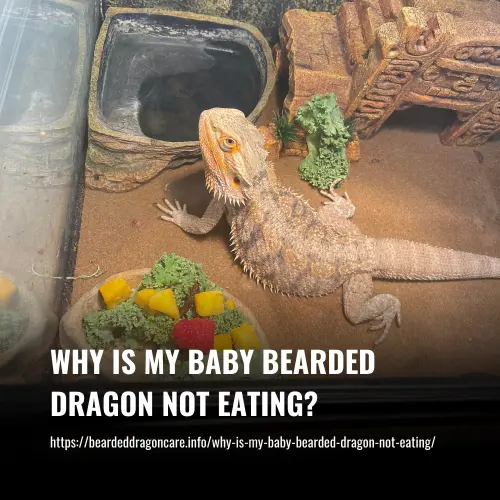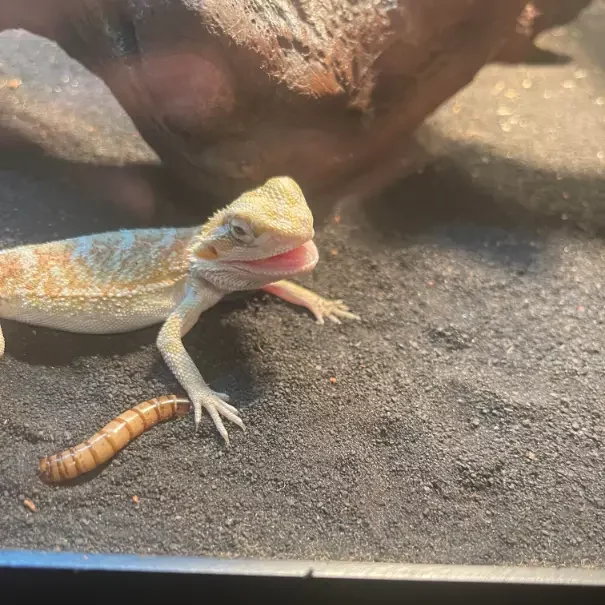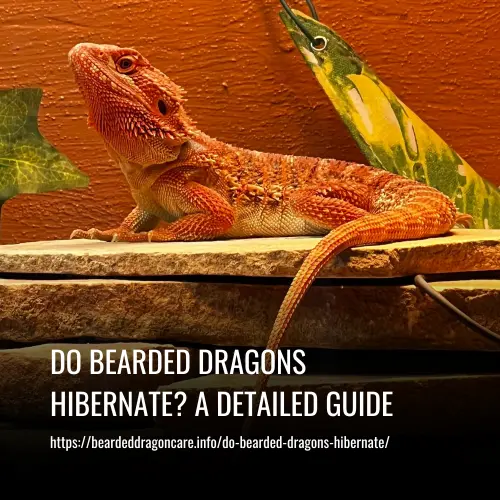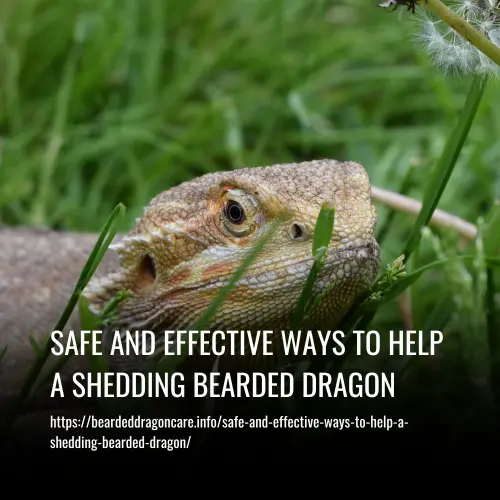Bearded dragons are fascinating pets, but if your baby dragon isn’t eating then you’re likely wondering what’s going on. This can be concerning for a new bearded dragon owner and it’s important to address the issue in order to keep your pet healthy.
When a baby bearded dragon isn’t eating, there can be many potential causes ranging from stress to illness. It’s important to identify the cause as soon as possible so that you can get your little reptile back to its normal routine of eating and enjoying life!
In this article, we’ll look at why your baby bearded dragon may not be eating and discuss some steps that you can take to help them return to their regular feeding schedule.

Reasons Why Your Baby Bearded Dragon Isn’t Eating
When it comes to your baby bearded dragon, not eating can be a worrying sign. That’s why we’ve put together a list of eight possible reasons your baby dragon may not be eating.
By understanding each of the possibilities and how to tell which one is affecting your pet, you can make sure they are given appropriate care.
New to Your Home
When you bring a baby bearded dragon into your home, it will need time to settle in and adjust. Everything is new to them and even you can be seen as a predator at first. This initial transition can lead to quite a lot of stress, and they may not want to eat at all or just not as much as usual.
It’s best not to let this go on for too long as the combination of eating less and being under heightened levels of stress is bad for them over an extended period. The best way to help your beardie adapt is by giving them some space, avoiding excessive handling, and keeping any large pets away from their tank for the first week or two.
Brumation
Brumation is a reptile’s equivalent to hibernation. When the temperature drops, usually in wetter or colder seasons, a reptile’s body slows down and stores energy often so that they don’t have to eat or drink as regularly, just like if they were asleep.
Baby bearded dragons in particular may go into brumation which is reflected by their lack of movement and interest in food items. You will be able to tell when they are sleeping more than usual and hiding away regularly.
Nonetheless, provide them with fresh water still from the dish inside the enclosure occasionally and observe if they drink from it; if yes, then your dragon is probably brumating. Otherwise, it could be an illness and demand for a vet trip.
Shedding
Shedding is an important and normal process for baby bearded dragons, and it may be the reason why they’re not eating. As they grow in their first year of life, the skin becomes too small and sheds more often than an adult dragon – up to every few weeks.
During shedding, your baby beardie will move less and reduce its water intake and appetite. So if you notice that your youngster is showing signs of shedding (dry patches on its skin, for instance), then this could be the cause for its lack of appetite.
Aging
The aging of your bearded dragon can be a major factor in why it may not be eating. As the reptile gets older, it will require less food than before. For younger dragons, it is important to provide more protein or live insects in order for them to remain healthy and thrive.
On the other hand, older dragons tend to do better on a diet of vegetables and greens that are fed at a lower frequency. This is something you have to keep an eye on as your dragon grows up, making sure their dietary needs are met throughout its life.
The chart provides information on the recommended feeding amounts for baby bearded dragons according to their age.
| Age | Diet Ratio | Amount | Frequency |
| <2-3 mo | 70% Insect 30% Veg | 30-80 daily insects | 3-5 feedings per day |
| 3-8 mo | 70% Insect 30% Veg | 30-80 daily insects | 2 feedings per day |
| 8-12 mo | 70% Insect 30% Veg | 30-80 daily insects | 1 feeding per day |
| 12+ mo | 30% Insects 70% Veg | 50 weekly insects | rotating meals* |
Low UVB Light
One of the key reasons why your baby bearded dragon isn’t eating could be due to low UVB light. Bearded dragons normally come from a sunny environment which allows them to get nutrition from the sun’s rays, providing them with all they need to stay healthy and active.
If you do not have a basking lamp that emits these rays then your baby beardie won’t be getting the necessary nutrition it requires, making it feel unwell and cautious about eating.
To ensure your bearded dragon is receiving an adequate amount of UVB light, invest in an actual basking lamp meant for reptiles such as this one by Zoo Med on Amazon. If your current light is not functioning properly, it may be necessary to replace it.
Low Temperature
One of the main reasons why your baby bearded dragon may not be eating is because of the low temperature in the enclosure. As adults, these reptiles gain energy from higher temperatures in their living space, so if it’s not hot enough, then they lack the energy to eat.
Accurate thermometers are required for measuring temperature in reptile enclosures. The ideal basking temperature for babies should be between 100° – 110° degrees Fahrenheit (38° – 43° C), while 105° degrees Fahrenheit (40° C) is preferable for adult dragons.
Additionally, the overall temperature should hover around 90° degrees Fahrenheit (32° C), with a cooler spot between 70-85 degrees Fahrenheit (21-29 °C). The lamp should be switched off at night and kept at a temperature of between 65 – 70 degrees Fahrenheit (18-21 °C).
Change in Surroundings
One of the key reasons why your baby bearded dragon may not be eating is due to changes in its surroundings. Any kind of change, from the location of the tank to new plants and decor, can cause uncertainty and stress for your reptile. This stress can lead to increased hiding and a decline in appetite.
To ensure your dragon feels safe and secure, it’s best to introduce changes one at a time rather than rapidly shifting around its environment. This will also give you an opportunity to observe how they react and look out for any behavioral issues that arise as a result.
It usually takes several weeks for baby dragons to adjust to new owners and environments, so try not to make too many drastic changes during this period.
Constipation or Impaction
Constipation is one of the main reasons why your baby bearded dragon isn’t eating. We know a reptile’s stomach is smaller than we’d think and can quickly fill up, taking away its appetite.
As a reference point, baby (0-3 months) bearded dragons will typically defecate once a day, and juveniles every other day. If you notice your pet’s not going at this frequency, then it might just be constipated.
In this case, you can gently massage their belly or give them a bath to help move things along. But if this doesn’t work, then it would be worth visiting your vet for some more assistance and advice.
Stress
Stress is one of the major reasons why your baby bearded dragon is not eating. When a baby bearded dragon is stressed, it may hide all the time and become jumpy and twitchy.
Common factors that can get a young beardie feeling threatened are rapid changes in light, relocation, other reptiles in their enclosure, loud noises, and new additions to the environment or new people handling them.
To help reduce your baby beardie’s stress levels, you need to remove potential threats and overstimulation from their environment. Make sure they have a safe place to retreat and feel comfortable around you by providing treats when you handle them and getting them used to your scent again.
Change in Diet
A change in diet could be the reason why your baby bearded dragon isn’t eating as much. Bearded dragons are creatures of habit, so when something as integral to their life as their diet changes, they can feel and notice the difference, leading them to eat less or not at all.
It’s important to consider if you’ve recently made any changes to your pet’s diet – if so, this could certainly explain the decrease in appetite. If this is the case, try giving it a few days and see if they get used to the new food and eventually embrace it.
As a precaution for future situations, always keep some of the old food around (if possible) and mix it with the new recipe for a smoother transition.
Other Household Pets
It is important to consider how your baby bearded dragon may perceive other household pets. For instance, cats and dogs can be seen as predators by your pet. This fear can cause a lot of stress and intimidation, even if your beardie has been with you for some time and has become accustomed to the environment.
For example, if a dog that was previously comfortable around your pet suddenly starts barking at it, then this could also be a source of stress. If you have multiple animals in the home, watch closely how they interact and react to each other to get an indication of their relationship and if anxiety or fear may be preventing them from eating.
Injury
Injury is a common reason why baby bearded dragons may not be eating. If your little bearded friend has been injured, the signs can be fairly obvious – they may show a reduced appetite or even stop eating altogether.
Additionally, they may appear to be in pain when walking or hiding more often than usual. If you suspect that your beardie might have been injured, it’s important to observe them closely and seek the advice of your vet as soon as possible for proper treatment and recovery.
Illness or Infection
Illness or infection can be a serious cause of your baby bearded dragon’s refusal to eat. Common symptoms include general lethargy and, obviously, having no appetite. Harmful parasites and mouth rot are two main culprits as well as metabolic bone disease (MBD).
To ensure your pet is always safe from harm it is highly recommended to take them to the vet for regular check-ups, especially if any unusual behavior is spotted. Illnesses such as infections can develop in a number of ways so it is best to catch them early on and provide the necessary treatment for your bearded dragon.
How Long Can a Baby Bearded Dragon Go Without Eating
Knowing how long a baby bearded dragon can go without eating is important in order to ensure its health and well-being. Adult bearded dragons that have plenty of fat stores can typically last up to two months without a meal, but this isn’t recommended and could cause potential health issues.
When it comes to baby and juvenile bearded dragons, their metabolic rate is much faster and therefore they need food more frequently than adults. As such, it can be difficult to put an exact time scale on exactly how long they can go without food as factors such as their age, weight, size, diet, and fat stores will all have an effect.
If a baby bearded dragon has not eaten after two to three days, it is advisable to consult a veterinarian.
When Should We Go to the Vet
Knowing when to take your baby bearded dragon to the reptile vet is key. If you notice any changes in stool, such as a runny or black color, visible injuries, extremely aggressive or hiding behavior that you can’t calm, mucus, discoloration, or swelling of the mouth or head, these are all signs that you should be bringing your reptile to the vet for additional examination and treatment.
If other possible issues have been ruled out and your baby still hasn’t been eating regularly, then it might be a good time to take them to the reptile vet for further medical evaluation. Catching illnesses early on will help ensure a better prognosis during treatment.
How to Get a Baby Bearded Dragon to Eat
Getting a baby bearded dragon to eat doesn’t have to be a challenge. With the right strategies in place, you can help your little scaly friend start eating again.

Offer a Variety of Food Items
Offer your baby bearded dragon a selection of different food items to help get them to eat. Bearded dragons tend to be exploratory and curious about new foods, so present them with some vegetables and fruits as well as insects such as crickets or mealworms. Endive, mustard greens, squash, apples, and blueberries are all popular food items for these reptiles.
By offering your baby bearded dragon a variety of food options it can provide an enticing environment that encourages them to try out the different tastes and textures on offer. This can assist in getting them interested in eating which can be tricky for baby dragons who may not yet recognize the need for nutrition.
Dust Food with Calcium and Other Vitamins
In order to ensure that your baby Bearded Dragon is getting all the nutrients it needs for healthy growth and development, it’s extremely important to dust its food with calcium and other essential vitamins. Adding this supplemental powder can provide your bearded dragon with essential vitamins such as calcium, vitamin D3, and other important minerals.
These powders are specifically designed for bearded dragons and can be purchased from either a pet store or online. When you’re ready to feed your Beardie, sprinkle a small amount of this powder on top of their food before serving – this will ensure that they’re getting all the necessary vitamins in their diet.
Place Food in Different Locations Around the Enclosure
Placing food in various locations around the enclosure can be an effective way to entice a baby bearded dragon to eat. Bearded dragons naturally like to explore, so putting food in different spots can encourage them to seek out new possibilities and give them the incentive they need to start eating.
Place items like plants, fruits, and vegetables in hiding spots, crevices, or atop rocks and branches within their habitat. This will provide your dragon with multiple options as they explore their environment and discover tasty new foods! Additionally, this also helps stimulate their natural appetite as they must wander and search for food.
Use Tweezers to Gently Place Food Near the Dragon’s Mouth
If your baby bearded dragon is still not eating, you can use tweezers to gently place food near its mouth. This technique should only be utilized if your beardie is comfortable with being handled by you, with no signs of stress or discomfort.
Then, simply pick up pieces of food using the tweezers and place them close to their mouth. This can help get them in the mood for feeding on their own.
Remember, this method should only be used if your dragon is comfortable and relaxes without any stress when touched. Otherwise, avoid this technique as it only adds unnecessary pressure to the animal that could result in further distress.
Make Sure the Food is the Right Size
It’s important to make sure that the food you feed your baby bearded dragon is the right size. Bearded dragons have quite small mouths, and it’s essential that the food should never be bigger than the space between their eyes. Pieces too big for them to eat can be tricky to manage or even a potential choking hazard, so always go with smaller pieces if unsure.
If you’re ever unsure about what size food to feed your dragon, then it is best to choose smaller pieces instead of larger ones. And don’t worry – if necessary you can always break larger pieces into smaller bits so they’re easier for your dragon to eat!
Monitor the Temperature of the Enclosure Carefully
Keeping the temperature of your baby bearded dragon’s enclosure at the proper level is key to getting it to eat. If the temperatures are too low, your little dragon won’t be able to digest its food properly. That’s why it’s so important to monitor the temperature of their enclosure carefully.
Using a thermometer to check on temperatures is an absolute must when trying to get your baby bearded dragon to eat. Make sure that the basking spot is warm and inviting enough for them, usually between 95-110°F. It’s also good practice to ensure that the cooler areas are between 70-85°F in order for them to have a comfortable range for movement throughout their space.
Stimulate Appetite with Live Insects
Live insects can be a great way to stimulate your baby bearded dragon’s appetite. Many of these little reptiles enjoy the excitement of chasing and catching live bugs, prompting them to start eating. You could try offering your pet crickets, mealworms, superworms, waxworms, or roaches.
Not only do live insects provide plenty of stimulation and fun for beardies, but they also supply essential proteins, fats, and vitamins – so they are a great way of ensuring your dragon has an all-around balanced diet.
Conclusion
In conclusion, there are many potential reasons why your bearded dragon is not eating and it’s important to identify the cause by observing its behavior and seeking veterinary advice if necessary. Fortunately, there is also a wide range of solutions that can be implemented to help your pet once you have diagnosed the problem.
Whether it is adjusting their diet or creating an ideal habitat, with some patience and dedication you can ensure that your baby bearded dragon enjoys a long and healthy life.

